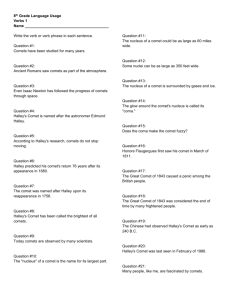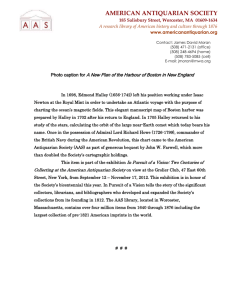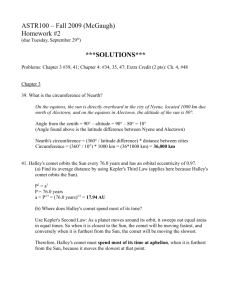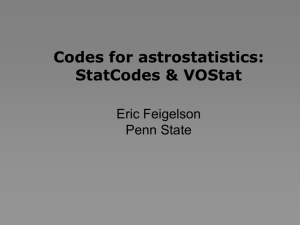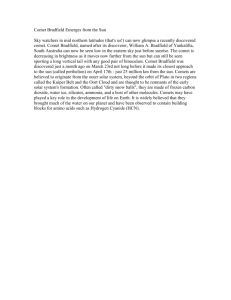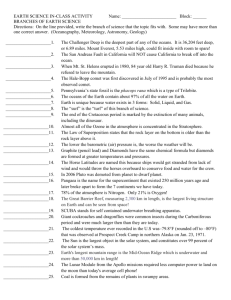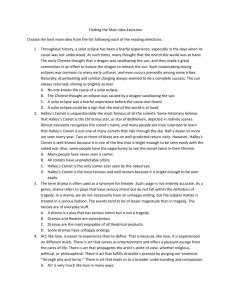PSAT review
advertisement
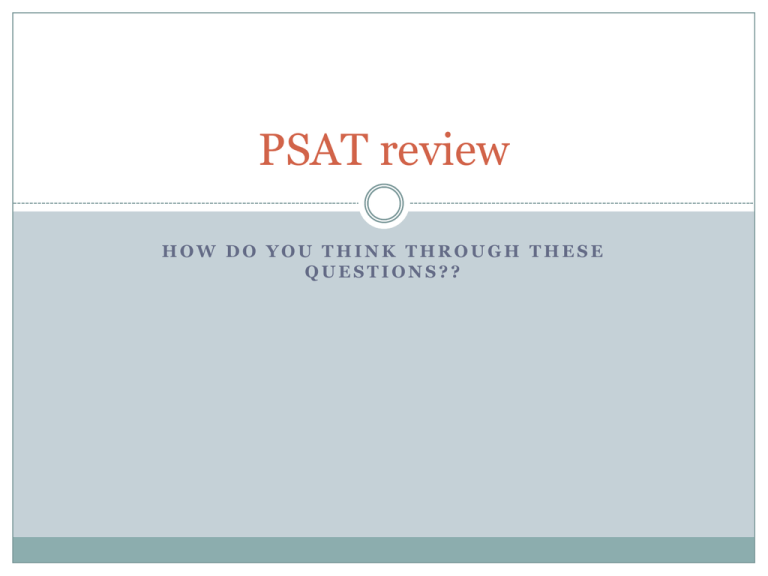
PSAT review HOW DO YOU THINK THROUGH THESE QUESTIONS?? Skill: Manage Word Choice and Grammatical Relationships Between Words Where is the error (if there’s an error…)? Eighteenth-century French mathematician Sophie Germain was initially discouraged by her parents A to study what was then widely considered a subject B C unsuitable for women. No error D E Section 5, Question #34 Eighteenth-century French mathematician Sophie Germain was initially discouraged by her parents A to study what was then widely considered a subject B C unsuitable for women. No error D E The error is B. It should read “from studying.” One is discouraged from doing something and encouraged to do something. Skill: Manage Word Choice and Grammatical Relationships Between Words Where is the error (if there’s an error…)? Presidents who have just left office may require some A time to find an appropriate way of serving the country B C he or she recently led. No error D E Section 5; Question #32 Presidents who have just left office may require some A time to find an appropriate way of serving the country B C he or she recently led. No error D E The error is D. The antecedent for this pronoun is “Presidents,” which is plural, so the pronoun at D should be “they.” Skill: Vocabulary in Context Which best fits the sentence? The critic’s review of Hollister’s latest novel was quite ________, predicting that the book would prove to be ________ for even the most devoted of Hollister’s fans. A. laudatory…an ordeal B. vindictive…a lark C. scathing…a banquet D. caustic…a trial E. insolent…a repast Section 1; Question #7 The critic’s review of Hollister’s latest novel was quite ________, predicting that the book would prove to be ________ for even the most devoted of Hollister’s fans. A. laudatory…an ordeal B. vindictive…a lark C. scathing…a banquet D. caustic…a trial E. insolent…a repast The answer is D. Both blanks will be either positive or negative; the sentence has a direct (not negative) comparison. “Laudatory” in A means to praise; “a lark” in B is a fun and easy event; “scathing” in C means very critical; “caustic” in D means very critical; “repast” in E is a meal. C and E make NO sense… both “banquet” and “repast” are related to food/eating. Skill: Understanding Literary Elements Read the passage about Mr. Hosokawa on the handout. Annotate as you read. In the context of the passage as a whole, the first paragraph serves primarily to A. state the narrator’s view of the main characters B. introduce a criticism of language education C. reveal the location for the story that follows D. prepare the reader for a significant contrast E. demonstrate the scale of a social problem Section 3; Question #44 In the context of the passage as a whole, the first paragraph serves primarily to A. state the narrator’s view of the main characters B. introduce a criticism of language education C. reveal the location for the story that follows D. prepare the reader for a significant contrast E. demonstrate the scale of a social problem The answer is D. The words and phrases “When he was younger,” “but,” and repeated “some” all indicate comparison or contrast. The final sentence “What he went through before Gen” sets up contrasting Mr. Hosokawa’s situation before and after Gen’s employment. Skill: Understanding Literary Elements Based off the Mr. Hosokawa passage from yesterday: Which best characterizes the way in which the third paragraph is presented? A. A detached observer reports a variety of factual data. B. A satirical commentator mocks some formal actions. C. An objective account is followed by a subjective reaction. D. An exaggerated description is qualified by the narrator. E. An imagined event parallels actual ongoing events. Section 3; Question #45 Which best characterizes the way in which the third paragraph is presented? A. A detached observer reports a variety of factual data. B. A satirical commentator mocks some formal actions. C. An objective account is followed by a subjective reaction. D. An exaggerated description is qualified by the narrator. E. An imagined event parallels actual ongoing events. The answer is C. The first sentences of paragraph 3 recount exactly what Gen did. Beginning with “Mr. Hosokawa heard something…” the paragraph gives how Mr. Hosokawa felt about Gen’s voice. Skill: Manage Word Choice and Grammatical Relationships Between Words Which is the best wording for the underlined portion? The fashion writer walked into a boutique and, seeing the latest styles on display, it reminded her of the colorful dresses that Frida Kahlo had worn more than 50 years earlier. A. it reminded her B. they reminded her C. which reminded her D. were reminded E. was reminded Section 5; Question #17 The fashion writer walked into a boutique and, seeing the latest styles on display, it reminded her of the colorful dresses that Frida Kahlo had worn more than 50 years earlier. A. it reminded her B. they reminded her C. which reminded her D. were reminded E. was reminded The answer is E. The underlined words should finish the clause begun with “The fashion writer…” The subject for the underlined verb is still “writer,” which is singular. Answer choices A, B, and C are worded as if the “styles” were the subject. Skill: Manage Word Choice and Grammatical Relationships Between Words Which is the best wording for the underlined portion? Her poetry, most of which is about the birds and other animals she encounters on her daily walks, give the illusion of being composed in the language of everyday conversation. A. poetry, most of which is B. poetry, most of it being C. poetry, which is mostly D. poems, most of them are E. poems, most of which are Section 5; Question #19 Her poetry, most of which is about the birds and other animals she encounters on her daily walks, give the illusion of being composed in the language of everyday conversation. A. poetry, most of which is B. poetry, most of it being C. poetry, which is mostly D. poems, most of them are E. poems, most of which are The answer is E. Later in the sentence, after the appositive phrase, the main clause’s verb is “give.” Since “give” is a plural verb (they give, not he give, right?), the subject in the underlined portion must be plural. This eliminates A, B, and C. Between D and E, “most of which” correctly refers back to “poems.” Skill: Manage Phrases and Clauses in a Sentence Which is the best wording for the underlined portion? One of the students collected specimens of plants native to her region that were then labeled and arranged by her in a display case. A. region that were then labeled and arranged by her B. region that she then labeled and arranged them C. region and labeling them and arranging them D. region, labeled them, and arranged them E. region, then she labeled and arranged them Section 5; Question #18 One of the students collected specimens of plants native to her region that were then labeled and arranged by her in a display case. A. region that were then labeled and arranged by her B. region that she then labeled and arranged them C. region and labeling them and arranging them D. region, labeled them, and arranged them E. region, then she labeled and arranged them The answer is D. It is the most concise (least wordy and most direct) way to say this. Skill: Manage Grammatical Structures Used to Modify or Compare Which is the best wording for the underlined portion? Making its return to the inner solar system after a 76-year absence, Chinese astronomers observed Halley’s Comet in 240 B.C.E. Chinese astronomers observed Halley’s Comet in 240 B.C.E. B. it was Chinese astronomers who in 240 B.C.E. observed Halley’s Comet C. observations of Halley’s Comet were made by Chinese astronomers in 240 B.C.E. D. Halley’s Comet was observed by Chinese astronomers in 24o A. B.C.E. E. in 24o B.C.E. Chinese astronomers observed Halley’s Comet Section 5; Question #14 Making its return to the inner solar system after a 76-year absence, Chinese astronomers observed Halley’s Comet in 240 B.C.E. A. Chinese astronomers observed Halley’s Comet in 240 B.C.E. B. it was Chinese astronomers who in 240 B.C.E. observed Halley’s Comet C. observations of Halley’s Comet were made by Chinese astronomers in 240 B.C.E. D. E. Halley’s Comet was observed by Chinese astronomers in 24o B.C.E. in 24o B.C.E. Chinese astronomers observed Halley’s Comet The answer is D. The sentence begins “Making its return…,” so Halley’s Comet (not the astronomers) must be the subject of the sentence. Skill: Vocabulary in Context Which best fits the sentence? The word “snowflake” can refer to either a single ice crystal, a small cluster of ice crystals, or a large ________ formed when such clusters ________. A. classification…separate B. aggregation…cohere C. dimension…disperse D. accumulation…melt E. solution…collect Section 3; Question #26 The word “snowflake” can refer to either a single ice crystal, a small cluster of ice crystals, or a large ________ formed when such clusters ________. A. classification…separate B. aggregation…cohere C. dimension…disperse D. accumulation…melt E. solution…collect The answer is B. The sentence builds from “single” to “small cluster” to “large _____” so a word meaning “group” is needed in the first blank. This could be either B or D. The second blank needs a word that means “stick together,” so, even if cohere is an unfamiliar word, you should eliminate D because “melt” does not mean to stick together. Skill: Vocabulary in Context Which best fits the sentence? Since she was unaccustomed to playing _______ role at school board meetings, Marge did not _______ when asked to take the microphone and voice parents’ concerns. A. a submissive…acquiesce B. a confrontational…reciprocate C. an auxiliary…exult D. a passive…balk E. a public…demur Section 3; Question #29 Since she was unaccustomed to playing _______ role at school board meetings, Marge did not _______ when asked to take the microphone and voice parents’ concerns. A. a submissive…acquiesce B. a confrontational…reciprocate C. an auxiliary…exult D. a passive…balk E. a public…demur This one is really HARD!! The answer is D. If you reword to “She was not usually ____ at meetings, so Marge didn’t _____ when asked to speak” that might make it somewhat easier. An active (not passive) person would not hesitate (balk) to speak up. Still VERY TOUGH!
